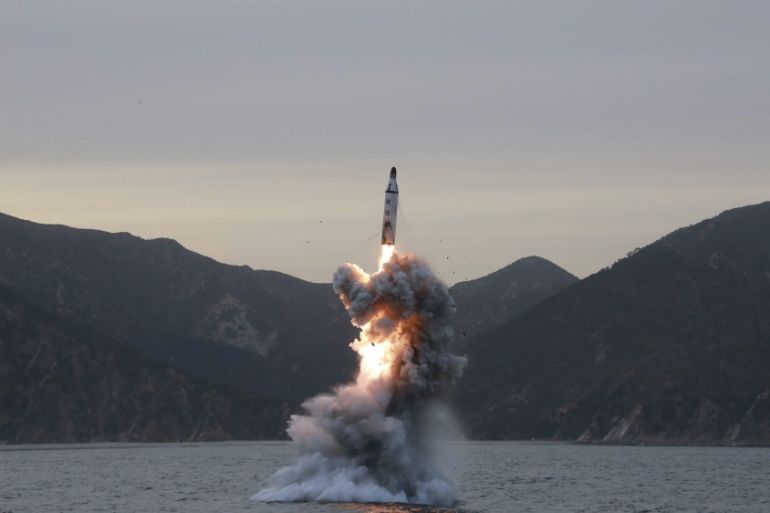North Korea missile lands near Japanese waters
Prime Minister Shinzo Abe calls launch “an unforgivable act of violence toward Japan’s security”.

A medium-range ballistic missile fired from North Korea has landed near Japanese territorial waters, according to South Korean and Japanese officials, the latest in a series of such launches.
A suspected Rodong missile was fired on Wednesday from the North’s western Hwanghae province, the governments said.
Keep reading
list of 4 itemsNorth Korea says Kim Jong Un oversaw test of new hypersonic weapon
North Korea claims progress in development of hypersonic missile
North Korea’s Kim oversees ‘super-large’ rocket launcher drills
Japan’s defence ministry said the missile landed inside Japan’s exclusive economic zone, a 200-nautical-mile offshore area where Tokyo has sovereign rights for exploring and exploiting resources.
“It imposes a serious threat to Japan’s security and is an unforgivable act of violence toward Japan’s security,” Prime Minister Shinzo Abe said.
The US Strategic Command said North Korea had fired two presumed Rodong missiles simultaneously.
A statement said initial indications indicated one of the missiles exploded immediately after launch, while a second was tracked over North Korea and into the Sea of Japan.
The launch came after North Korea threatened “physical action” in response to a planned deployment of a US anti-missile system in South Korea, and just weeks before the start of annual joint South Korea-US military exercises, which Pyongyang says are rehearsals for a possible invasion.
Seoul and Washington have said the system, Terminal High-Altitude Area Defense, or THAAD, is needed to better cope with what they call North Korea’s increasing military threats.
UN resolutions
North Korea has called it a provocation that it says is only aimed at bolstering US military hegemony in the region.
READ MORE: Opinion – Now North Korea has nothing to lose
The United States condemned what it called a clear violation of UN Security Council resolutions prohibiting North Korea’s use of ballistic missile technology.
“This provocation only serves to increase the international community’s resolve to counter [North Korea’s] prohibited activities,” a Pentagon spokesman, Gary Ross, said.
In June, North Korea, after a string of failures, sent a mid-range ballistic missile more than 1,400km (870 miles) high.
In July, it fired three ballistic missiles into the sea, according to Seoul defence officials. The North later confirmed that it fired ballistic rockets carrying trigger devices for nuclear warheads as part of simulated pre-emptive atomic attacks on South Korea.
North Korea is pushing to manufacture a warhead small enough to be placed on a long-range missile that can reach the continental US, but South Korean defence officials say the North doesn’t yet have such a miniaturised warhead.